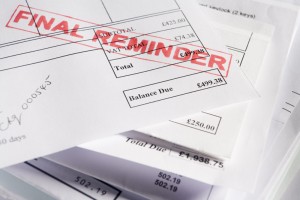 If you suspect your company is insolvent, now is the time to act. There are serious consequences you could face if you continue to trade knowing that your business is insolvent, up to and including fines and being unable to hold a director’s position for several years! As soon as you have doubts about your company’s solid footing the first thing to do is determine if you business is actually underwater or in danger of going under.
If you suspect your company is insolvent, now is the time to act. There are serious consequences you could face if you continue to trade knowing that your business is insolvent, up to and including fines and being unable to hold a director’s position for several years! As soon as you have doubts about your company’s solid footing the first thing to do is determine if you business is actually underwater or in danger of going under.
Check the Bills
Look at your bills; are they being paid on time? On time is not defined as before you are evicted, the utilities shut off or your supplier refuses to deliver. All of your bills should be paid on or before the date, they are due. If they are being paid late, even a few days, it is definitely time to look into your business and see if there is any way to rectify the situation.
Liabilities versus Assets
Another way to determine the financial well-being of your business is to look at your liabilities versus your assets. Even if you are having a bit of trouble with the bills you could still be solvent if your assets outnumber your liabilities. With that being said, it is still important that you determine where the problems are and set about fixing them immediately.
Trading Underwater
Should you determine your business is insolvent you may be able to continue to trade. However, the financial difficulty must be a temporary situation and you should have adequate proof that things will turn around shortly. For example, if you have a huge order going out in the near future that will put your business back into the black or you have a pending partnership agreement with a larger company you could continue to trade without fear of penalties.
Insolvent
At the end of the day if you determine that your business is completely insolvent and there is no hope of changing things anytime soon you need to call your accountant and perhaps the attorney’s to determine your next step. Many times this will mean entering a liquidation phase where you attempt to cover all company debts by selling off all inventory, returning supplies and selling furniture, equipment etc…
There are many forms of liquidation including compulsory, voluntary and creditors voluntary. Your accountant and attorney can advise you of the best way to proceed and which category your business falls into. You may have to take some extra steps if your business does not have enough assets to cover all of your liabilities.
Final Thoughts
There may come a time when you find your business is no longer profitable, in fact, it is in debt. This can happen to anyone particularly in the current economic climate. The important thing to remember is to act quickly, do not let the situation proceed beyond any possible hope of redemption through liquidation. You put yourself in the position to become personally responsible for the debts if you operate knowing full well the business is insolvent.


Recent Comments